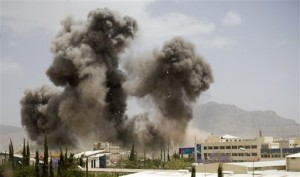Iran dispatched a naval destroyer and another vessel Wednesday to waters near Yemen as the United States quickened weapons supply to the Saudi-led coalition striking rebels there, underlining how foreign powers are deepening their involvement in the conflict.
Iran’s English-language state broadcaster Press TV quoted Rear Adm. Habibollah Sayyari as saying the ships would be part of an anti-piracy campaign “safeguarding naval routes for vessels in the region.”
The maneuver comes amid an intense Saudi-led Gulf Arab air campaign targeting the Yemeni rebels, known as Houthis, who come from a Shiite sect. Critics say Shiite power Iran backs the Houthis, though both the Islamic Republic and the rebels deny any direct military assistance.
Speaking a day earlier in the Saudi capital, Riyadh, U.S. Deputy Secretary of State Antony Blinken blamed the violence in Yemen on the Houthis, and forces loyal to former President Ali Abdullah Saleh, saying that the U.S. is committed to defending Saudi Arabia.
“We have expedited weapons deliveries, we have increased our intelligence sharing, and we have established a joint coordination and planning cell in the Saudi operations center,” he said in a statement to reporters after meeting with Saudi royals and Yemen’s President Abed Rabbo Mansour Hadi, who fled his country amid rebel advances.
Intelligence sharing includes making available raw aerial imagery the coalition could use to better strike anti-Hadi forces, said a U.S. defense official who was not authorized to comment publicly. Blinken said the U.S. and the six-nation Gulf Cooperation Council must coordinate closely and press all parties to seek a political solution.
The Gulf Arab-backed air campaign supporting Hadi, which began on March 26, has so far failed to stop the Houthis’ advance on Aden, Yemen’s second-largest city, which was declared the provisional capital by Hadi before he fled.
The U.S. says that the chaos has allowed the local al-Qaida branch, which it considers the world’s most dangerous wing of the group, to make “great gains” on the ground, causing Washington to rethink how it prevents it from launching attacks in the West.
Speaking from Tokyo, Defense Secretary Ash Carter said the collapse of the central government in Yemen makes it harder to conduct counterterrorism operations against al-Qaida, which has ambitions to strike Western targets, including the United States. Regarding the weapons deliveries, he said it involved “some resupply of equipment and munitions” to Saudi Arabia.
The World Health Organization warned Tuesday of an unfolding humanitarian crisis, saying at least 560 people, including dozens of children, have been killed, mostly in the air campaign and ground battles. The aid group said that over 1,700 people have been wounded and another 100,000 have fled their homes as fighting has intensified over the past three weeks.
Report by The Associated Press
 CGTN America
CGTN America Smoke billows from a Saudi-led airstrike on Sanaa, Yemen, Wednesday, April 8, 2015. A state-run broadcaster in Iran is reporting that the Islamic Republic has sent a navy destroyer and another vessel to waters near Yemen amid a Saudi-led airstrike campaign. (AP Photo/Hani Mohammed)
Smoke billows from a Saudi-led airstrike on Sanaa, Yemen, Wednesday, April 8, 2015. A state-run broadcaster in Iran is reporting that the Islamic Republic has sent a navy destroyer and another vessel to waters near Yemen amid a Saudi-led airstrike campaign. (AP Photo/Hani Mohammed)
